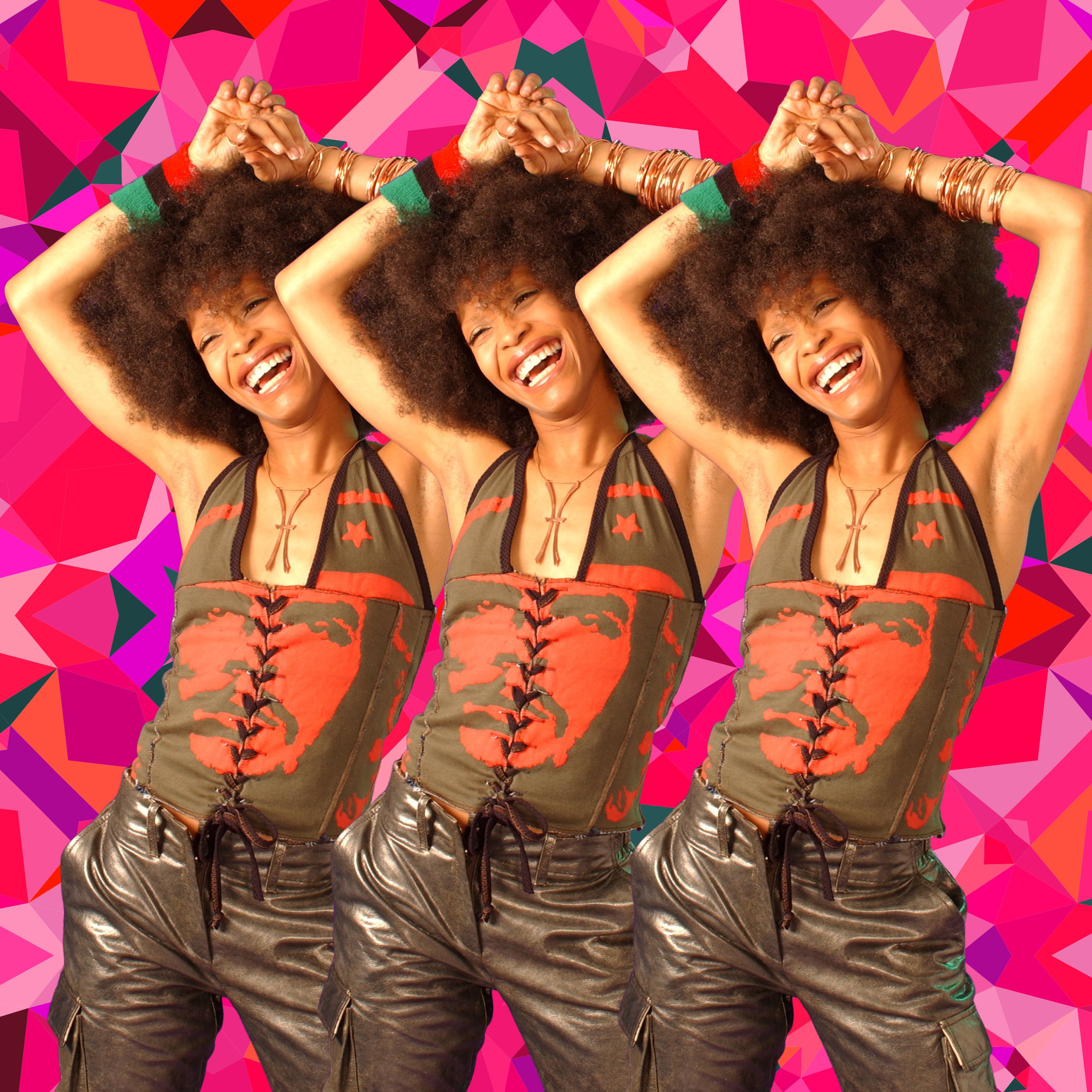
The year 1997 silenced Biggie Smalls and served Bill Clinton another term. South Park made us laugh for the first time; Steve Jobs went back to Apple. Musically, 20 years ago also marked the debut of a new voice, soulful and spiritual beyond her years: a 24-year-old singer-songwriter from Dallas by the name of Erykah Badu.
On February 11, Baduizm ignited a neo-soul wildfire from Badu’s adopted Fort Greene, Brooklyn, selling over three million albums, earning two Grammy Awards, and birthing its own concert album, Live, nine months later. Her music also did its part to shift R&B back down the lane of legends like Chaka Khan, Stevie Wonder and Marvin Gaye… only this time, remixed by hip-hop culture. The high headwraps, the incense, the ankhs—her branding totems stood as iconic as Michael Jackson’s sequined glove.
“As much as I appreciated it, it kind of made me feel trapped a little bit. I became the incense [and] candles poster child,” Erykah Badu says via cellphone from Dallas. “[The headwraps] just got heavy, physically and a little bit mentally, because of the expectations of what was under that wrap and what it came with. I remember riding the airplane and people treating me different, as if I were a diplomat, a goddess or an empress of some sort.”
A creatively restless Pisces, Erykah Badu was born Erica Abi Wright: the Southern-girl daughter of Kolleen Wright, who worked as an actress in local theatrical productions. From Erica to Erykah, she was by turns an aspiring singer, dancer and actress. Country Cousins, the 19-song demo she recorded in the early ’90s with her cousin Free, caught the attention of Kedar Masssenburg and included most of the songs eventually celebrated as the Grammy-winning Baduizm. By the time she relocated to Brooklyn, she was signed to Kedar/Universal and Baduizm finished, save for a few added tracks recorded in Philadelphia with The Roots.
“Penitentiary Philosophy” opened Mama’s Gun in 2000 with roaring guitar, a 180-degree turn from the sound of Baduizm. The success of her freshman effort made Baduizm a staple of bohemian coffee shops worldwide, and Badu had many more sounds and styles to express. In ’97, her mélange of jazzy R&B with the hip-hop aesthetic on tracks like “On & On,” the smoky nightclub vibe of “Otherside of the Game” and other Baduizm standouts came to define neo-soul (a phrase initially coined by Kedar Massenburg, then manager of both Badu and D’Angelo). Despite the immense success of Baduizm and her anointing as the “Queen of Neo-Soul,” Erykah’s embodiment of the new sub-genre didn’t last long.
Subscribe to our daily newsletter for the latest in hair, beauty, style and celebrity news.
“When I tried to go on to my next thing, more and more people were beginning to be put into that category that I didn’t feel were in the same group,” she says. By the new millennium, fans and critics alike gathered the likes of D’Angelo, Lauryn Hill, Maxwell, Jill Scott, India.Arie and Alicia Keys under the neo-soul umbrella. “I didn’t feel it was the same thing. I had so many different points of view that I didn’t want to just be in that group, because that label comes with a responsibility. And I didn’t want that responsibility. I wanted to just be able to create.”
Asked for a major memory of that time way back when—before single handedly inventing the term “woke” on 2008’s “Master Teacher,” before her two-million-followers strong Twitter handle @fatbellybella, before birthing three children (Seven, Puma, Mars) and becoming a licensed doula—Erykah Badu gets most nostalgic for the on-the-precipice period that pre-dated her worldwide fame.
“I was finishing up my album and I had moved to New York to a little apartment in Brooklyn,” she says. “I still have the same apartment, over [the clothing shop] Moshood. I rarely left that apartment. That place means so much to me, it’s like a little shrine. I would sit with my feet hanging out the window. People would pass by, say ‘hey’ to me. Nobody knew I had a record deal. It was the last of, I guess, my private life. I never had that anymore, because after Planet Groove on BET, everybody knew. I was trying to hold on to Erykah Badu, the little girl from Dallas.
“I remember just being in that space and being able to, if I wanted, go to the grocery store or different things. I could just do it,” she continues. “I envy those beginnings, because it’s a really sweet place. To know there’s something wonderful ahead of me if I work hard enough for it. Anticipating the super stardom and dreaming about those things were sometimes better than having them. I remember that.”